9 climbing plants to transform your house with sensational blooms
Discover the climbing plants that can revitalize your home's exterior and envelope it in fragrance and color

Thomas Rutter
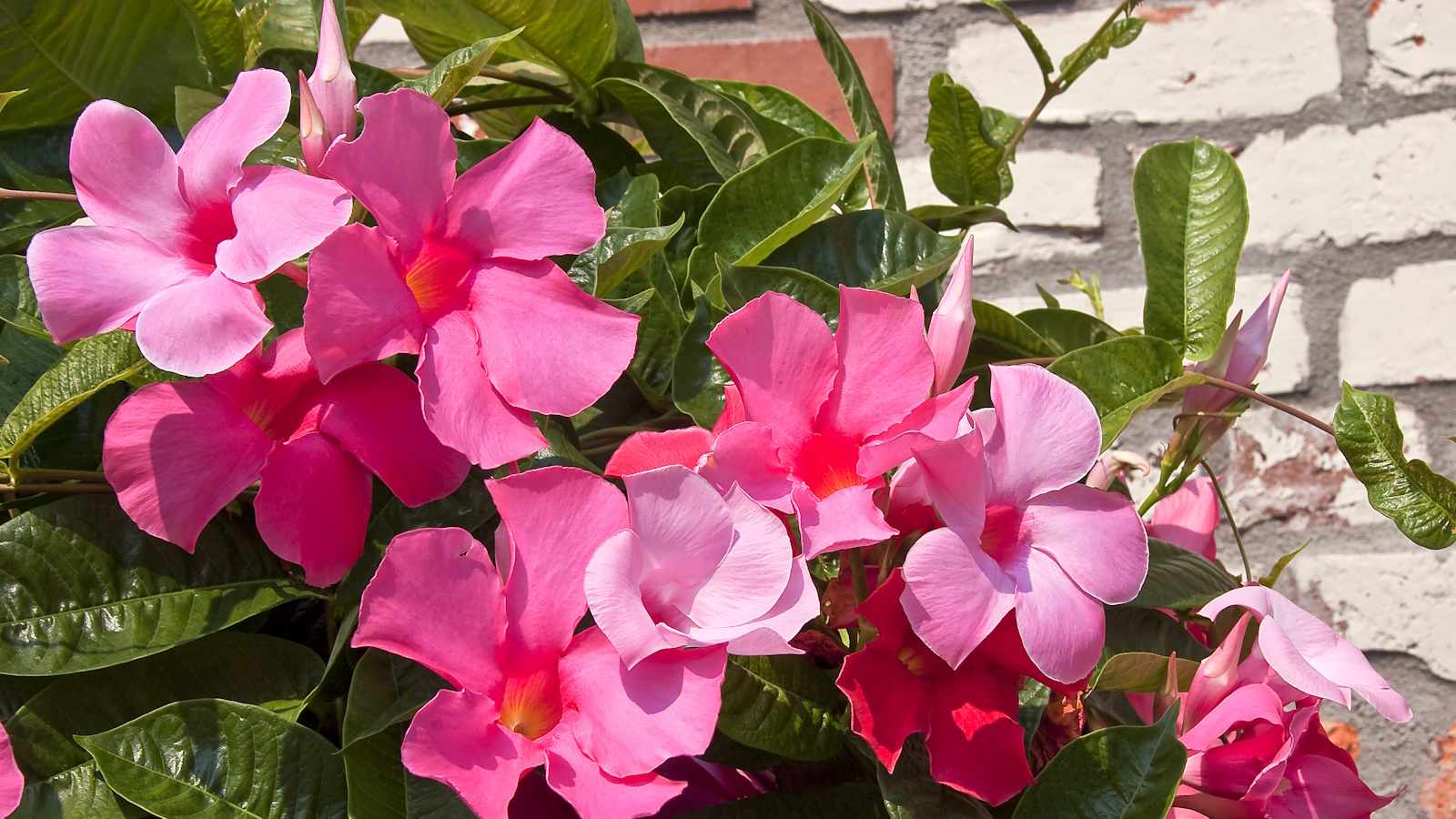
Design expertise in your inbox – from inspiring decorating ideas and beautiful celebrity homes to practical gardening advice and shopping round-ups.
You are now subscribed
Your newsletter sign-up was successful
Want to add more newsletters?

Twice a week
Homes&Gardens
The ultimate interior design resource from the world's leading experts - discover inspiring decorating ideas, color scheming know-how, garden inspiration and shopping expertise.

Once a week
In The Loop from Next In Design
Members of the Next in Design Circle will receive In the Loop, our weekly email filled with trade news, names to know and spotlight moments. Together we’re building a brighter design future.

Twice a week
Cucina
Whether you’re passionate about hosting exquisite dinners, experimenting with culinary trends, or perfecting your kitchen's design with timeless elegance and innovative functionality, this newsletter is here to inspire
If you want to refresh the exterior of your home and are looking for an alternative to painting it or installing shutters, how about adding a touch of nature by training some climbing plants up your walls? From clinging vines to romantic roses, most climbers – once established – demand little attention in return for a spectacular display of vibrant foliage and blooms.
Growing plants up the front of a house is an obvious focal point that lends itself to being surrounded with a deliciously fragrant vine such as star jasmine, climbing bourbon and noisette roses, but these perfumed heroes also work around bedroom and living room windows, and look glorious above a backyard patio.
There’s no need to stick to a single plant type either, often a mix of carefully chosen climbers can create multi-seasonal interest with the added bonus of successional blooms, fragrance and fruits.
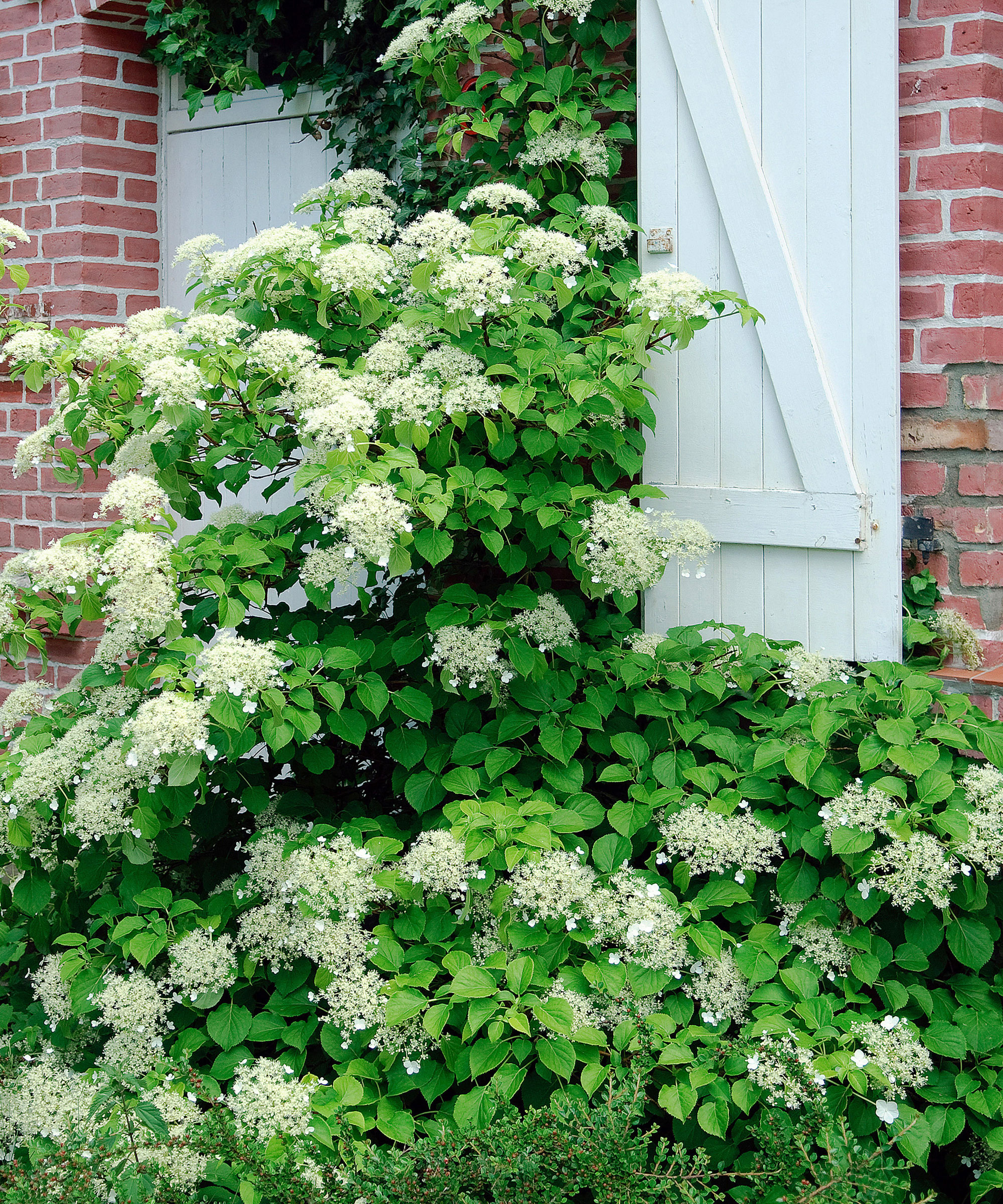
9 of the best plants to grow up a house
Think carefully about the areas of your home’s exterior that you wish to cover or highlight. Entrance porches and decks are made for cloaking in shade-giving passionflower and grape vines while other climbers, such as rugosa roses and pyracantha - can improve home security with their thorny stems.
Depending on your plant selection, you may need to fix up a framework of trellis or discreet wires and eyes to guide the stems and achieve the desired effect, but once in place the results will be spectacular. Grow them in containers, planters or directly into surrounding borders and be prepared to marvel at the sheer coverage and amount of growth just a few slender stems can provide. Here is our expert pick of climbing plants to grow up a house.
1. Madevilla
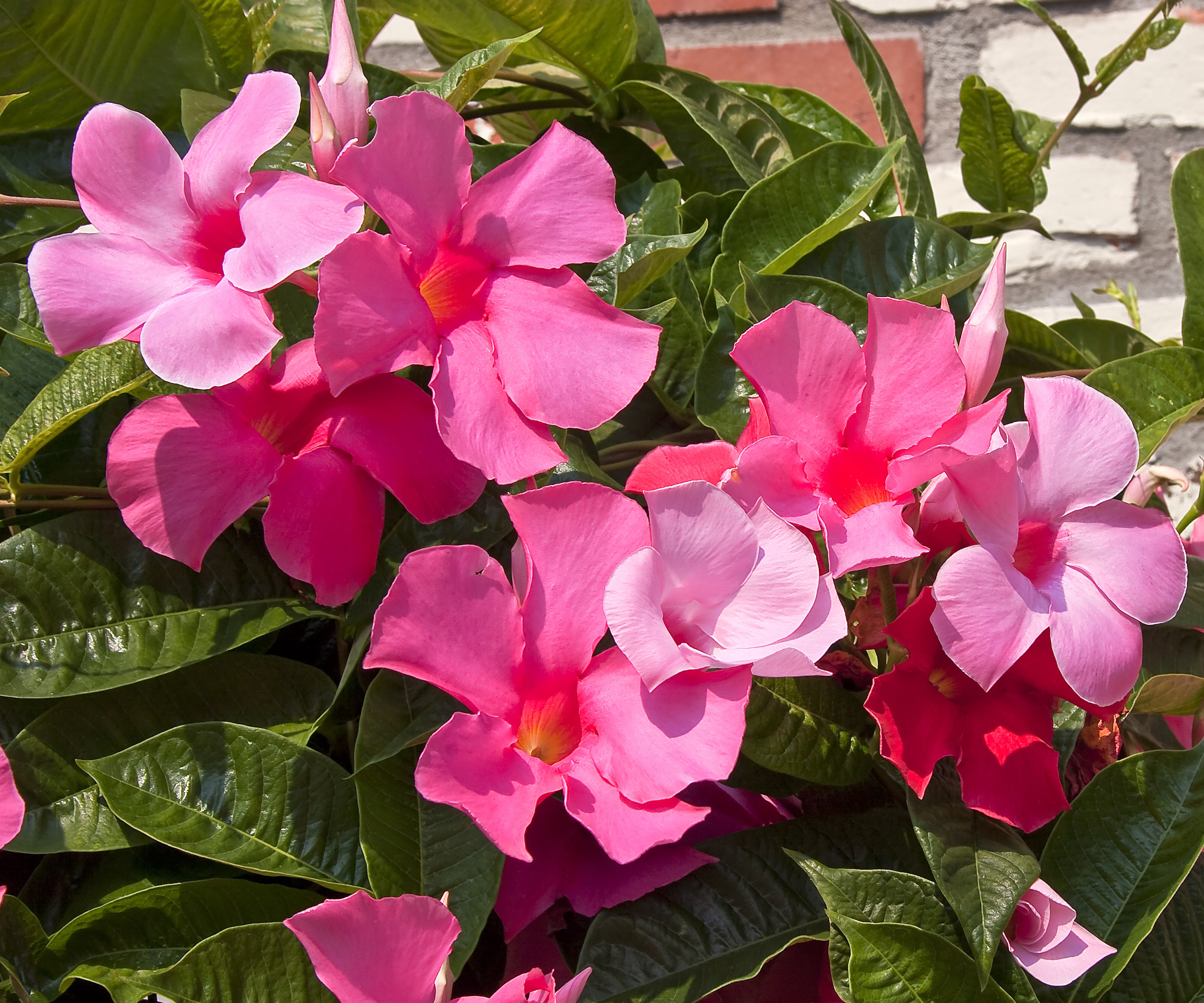
Native to the tropical regions of Central and South America, mandevilla - otherwise known as Brazilian jasmine - is a colorful and vibrant climber that grows best in warm regions. If you are a gardener wondering what to plant in zones 10 to 13, mandevilla is the plant to grow, thriving in sunny and humid areas.
Typically grown as a conservatory plant in cooler regions, these trumpet-like blooms are striking and slightly perfumed. If you have a sheltered yard and reside in a region where winter temperatures do not drop below 60ºF, this plant can be grown as an evergreen on an exterior wall.
Design expertise in your inbox – from inspiring decorating ideas and beautiful celebrity homes to practical gardening advice and shopping round-ups.
With colorful summertime blooms, this plant will certainly add impact to your home. In cooler regions with fluctuating temperatures, be warned that mandevilla might lose some of its foliage.
2. Climbing Rose
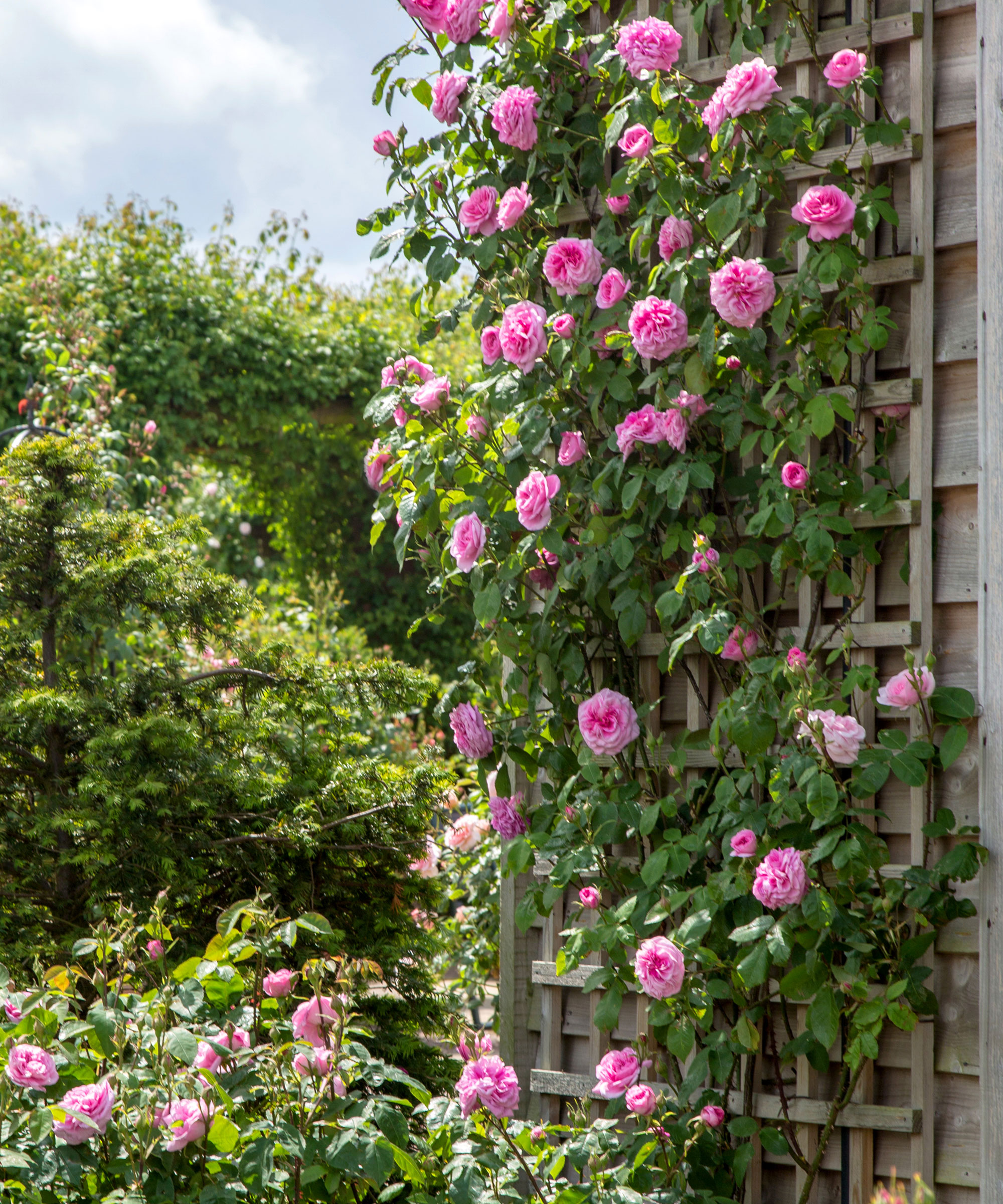
Quintessentially English, the sight of a perfumed rose covering the front of a house is the epitome of romantic, cottage garden style. A true vision of summer, if well planted and trained, they will dazzle with their succession of elegant blooms in every hue from purest white, soft pink through to deep orange and burgundy.
There’s a wealth of different climbing roses to choose from, in fact, many of these roses are climbing forms of shrub or bush varieties. Flower shapes can range from the seductively cupped and deeply ruffled damask to the open, five petalled blooms of the wild or species roses. Many varieties are prized for their fragrance too, from musky and rich myrrh tones through to fresh, light and citrusy. Together these qualities make roses an ideal choice for training around doorways and windows, so their beauty and perfume can be enjoyed inside and out of the home.
Knowing how to plant climbing roses is key to a strong and healthy long-lasting display. Their long, mostly thorn covered, stems or canes need tying into a robust support. This can be wood or metal trellis or wires secured the masonry by a series of steel eyelets. Use soft, flexible plant ties such as jute or Biostretch stretch plant tape from Amazon to avoid cutting into the stems and to allow for wind movement and growth.
3. Trumpet vine
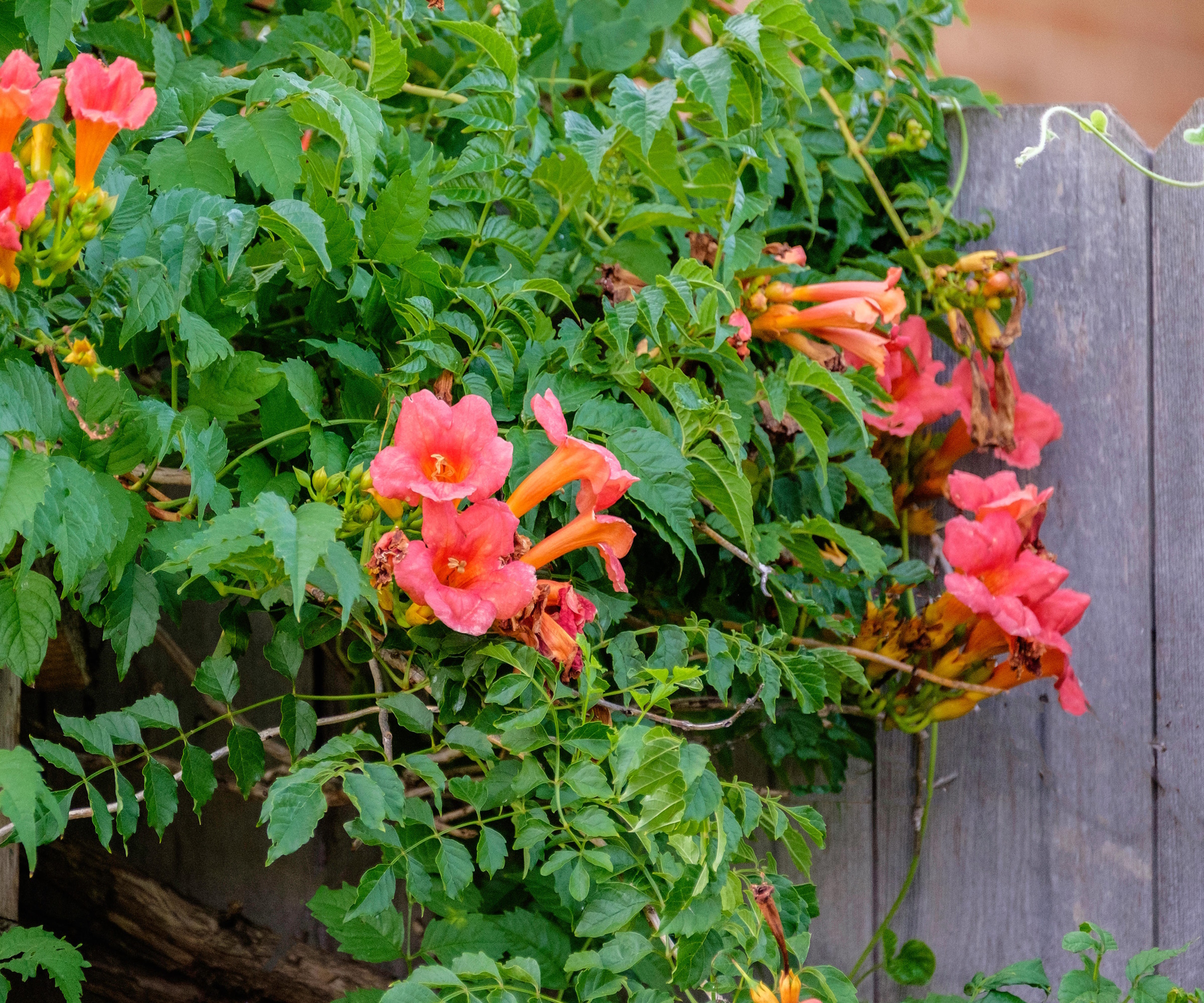
The perfect climbing plant for a tropical feel, the US native trumpet vine, or Campsis radicans, is a vigorous grower, climbing up to 30-40’ at maturity front of a home, even in colder climates.
Plant expert Katie Sunderlage explains, ‘hardy in zones 4-9, this beautiful vine features shades of red, coral and orange blooms that will attract hummingbirds in droves to your garden. What I like about trumpet vine is that as deciduous it can be cut back to the ground before winter each season if you don’t like the look of the exposed branches. It will quickly grow back in spring.’
Katie also adds, ‘Once trained, trumpet vine will easily self-cling to an arbor, trellis or any structure in the vicinity of where it was planted.’
Tempted to give this showy vine a try? Walmart has a great selection of these plants, including the gloriously pink 'Flamenco'.
4. Chilean potato vine
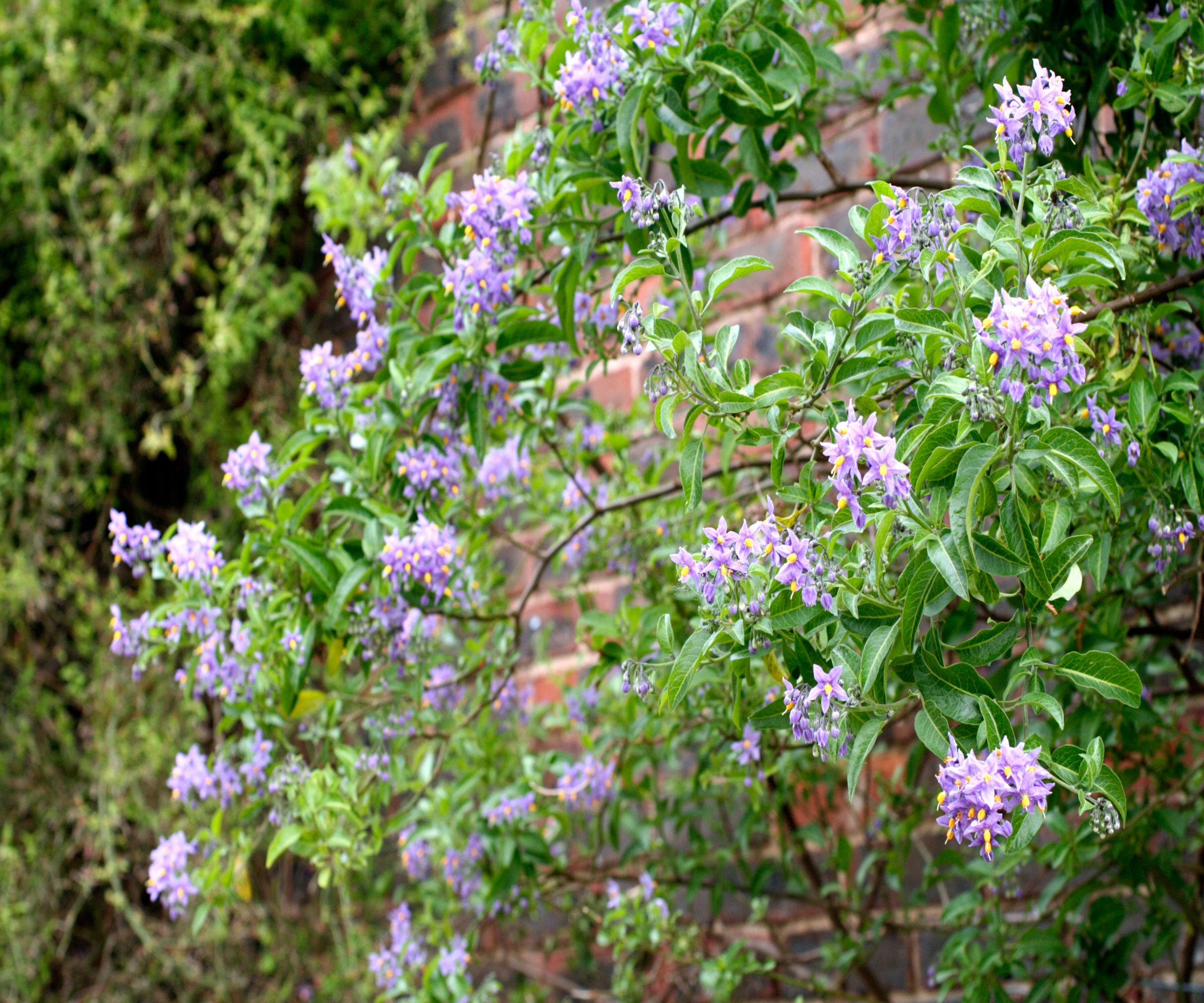
Seen from a distance, the exotic summer blooms of this climber blur to form a delicious violet-blue haze. With bright yellow central stamens, they appear continuously from mid-summer to mid-fall, and have a subtle sweet scent. The flowers mature to form pale yellow-orange fruit in fall and closely resemble tomatoes but are sadly inedible.
Also known as Solanum crispum, this wiry stemmed climber needs tying up to support wires at regular intervals to help it cover any structure. The oval foliage is semi-evergreen and will remain on the plant in all but the coldest temperatures.
Grow in moist, fertile soil in full sun for best results. Suited to USDA zones 9-11.
5. Black-eyed Susan vine
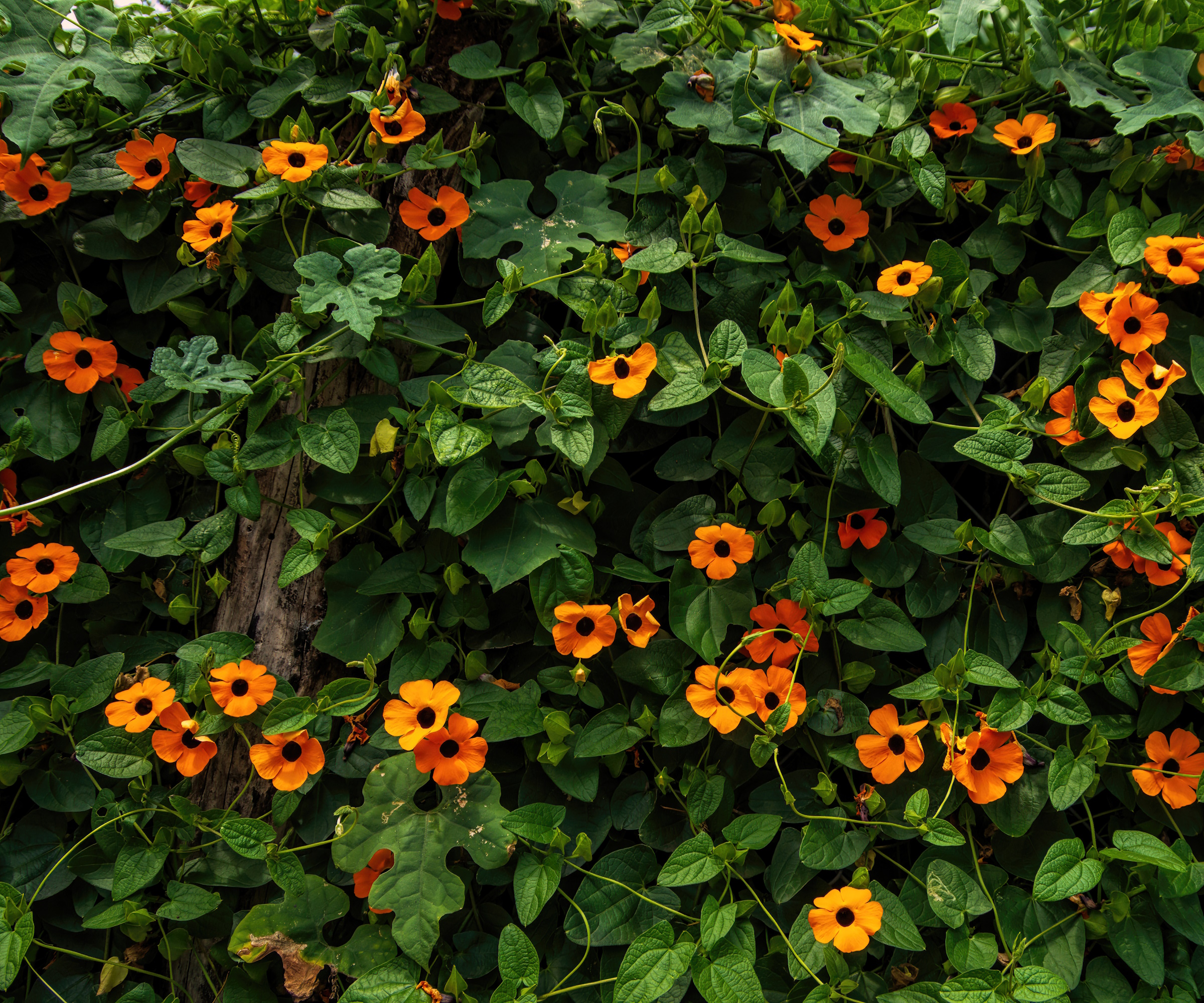
Black-eyed Susan vine, or Thunbergia alata, is a long-flowering annual that thrives in sunny and hot yards. This annual is notoriously fast-growing, often producing 6 to 8 feet of growth in one season, making this an ideal climber to cover trellises by the front door. This colorful climber is also considered one of the best plants to cover a shed, quickly adding greenery and blooms to dull garden structures.
With little maintenance, black-eyed Susan vines will thrive. While the plant does need a framework or trellis to grow over, gardeners do not need to worry about deadheading this climber, as it will keep on producing blooms through to the fall.
For the best results, feed your black-eyed Susan vines with a bloom booster fertilizer, available from Walmart, to encourage flower production for as long as possible.
6. Bougainvillea
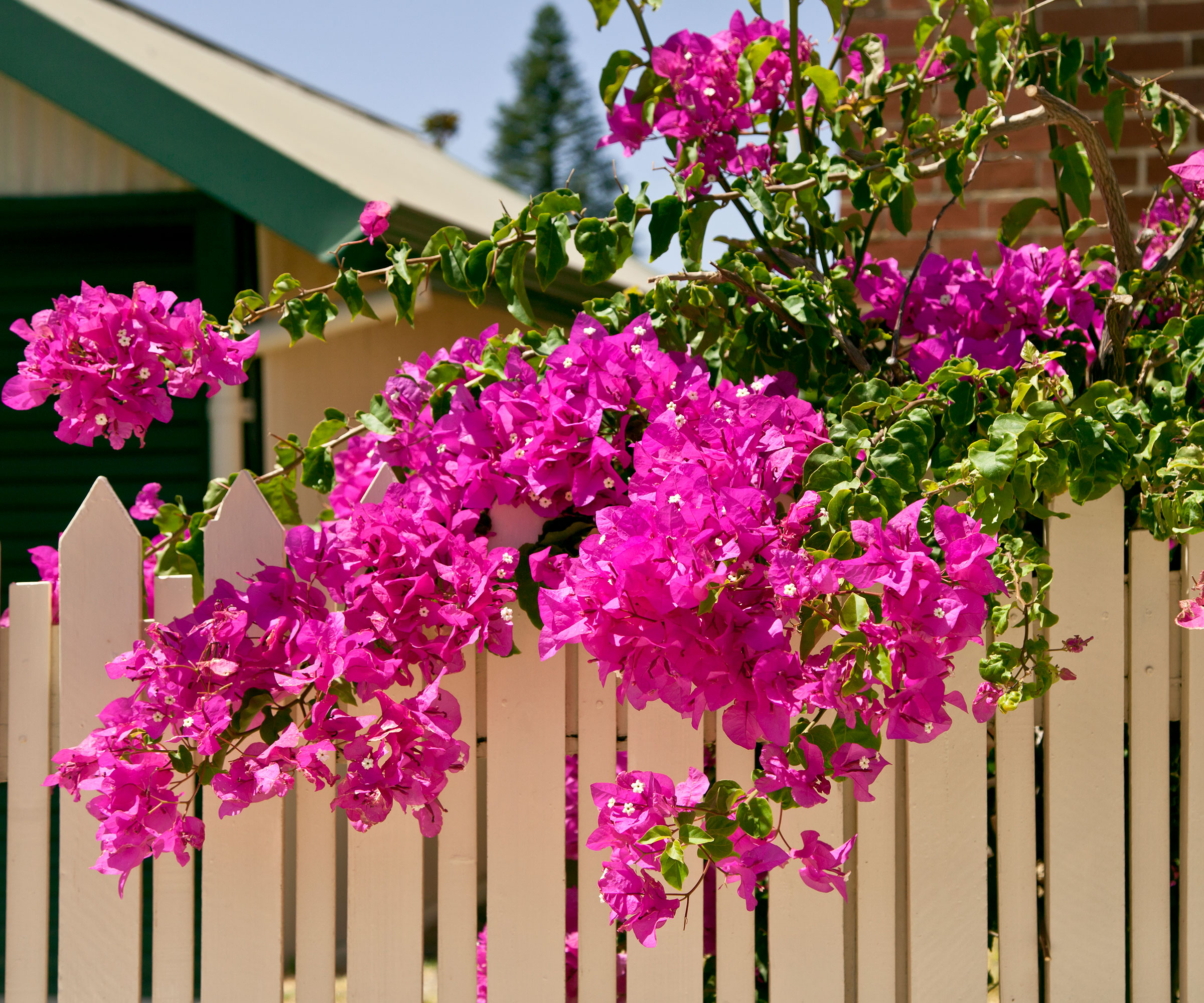
Instantly recognisable for its blast of spectacular color, this climbing plant is a memorable sight in the hot climates of Texas, Florida, Hawaii and all along the Gulf Coast. Reaching up to 20-30ft high with a spread of 8-10ft, they do need space and regular pruning, but dwarf varieties are available if you are looking for a more compact display.
‘Bougainvillea has always been one of my favorite climbing vines even though it isn’t hardy in my zone 5,’ explains Katie Sunderlage. ‘Although not hardy in a lot of cooler climates, bougainvillea can still be grown as an annual. Here they may not reach full size potential, but they are quite vigorous growers so will fill in and create a gorgeous vine in just one season. When growing in warmer climates have a plethora of blooms, creating a wall of color.’
While magenta and cerise are most recognizable colors for a bougainvillea, other shades are available too including orange, white and apricot. These vivid hues don’t even belong to the plant’s true flowers either, as these are white and rather indiscreet, instead it’s the dazzling papery bracts that surround the bloom and attract pollinators.
‘With the sheer number of blooms on one plant, these plants can become quite heavy,’ says Katie. ‘It’s a good idea to offer a strong structure to help the bougainvillea to grow on. Using an arbor or pergola to frame out a doorway or entrance is a perfect way to feature this stunning vine.’ She also adds, ‘Once established they rarely need watering but do prefer a fertilizer high in nitrogen to be applied throughout the season.’ Try BGI Bougain bougainvillea fertilizer from Walmart.
7. Grape vines
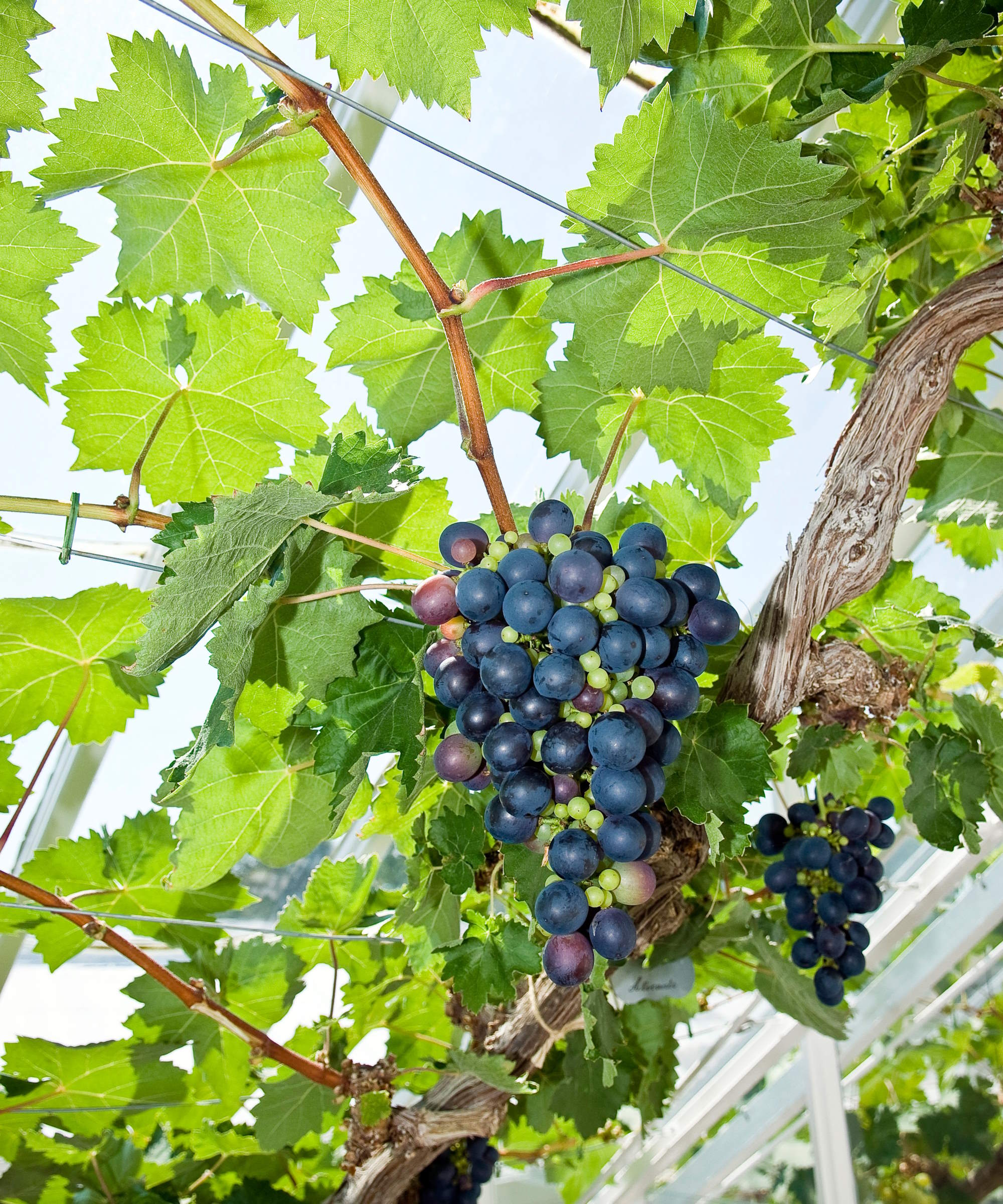
Grapes are the classic fruiting climber. Who wouldn't want delicious fruits grown in their backyard? These vines require some expertise, and it is important to learn how to grow grapes to encourage fruit development. For example, pruning grapes in the right way at the right time can often appear like a complicated science, but taking the time to learn is crucial to gardening success.
Grape vines, Vitis vinifera, thrive in sunny positions. In warmer regions, such as US hardiness zone 9, they can be trained to grow up ands over garden walls and structures. While the tasty fruits are what this crop is celebrated for, the small flowers of this vine are muted yet beautiful, with dainty white blooms appearing in spring.
Grape vines are available to buy as small plants from Walmart.
8. Honeysuckle
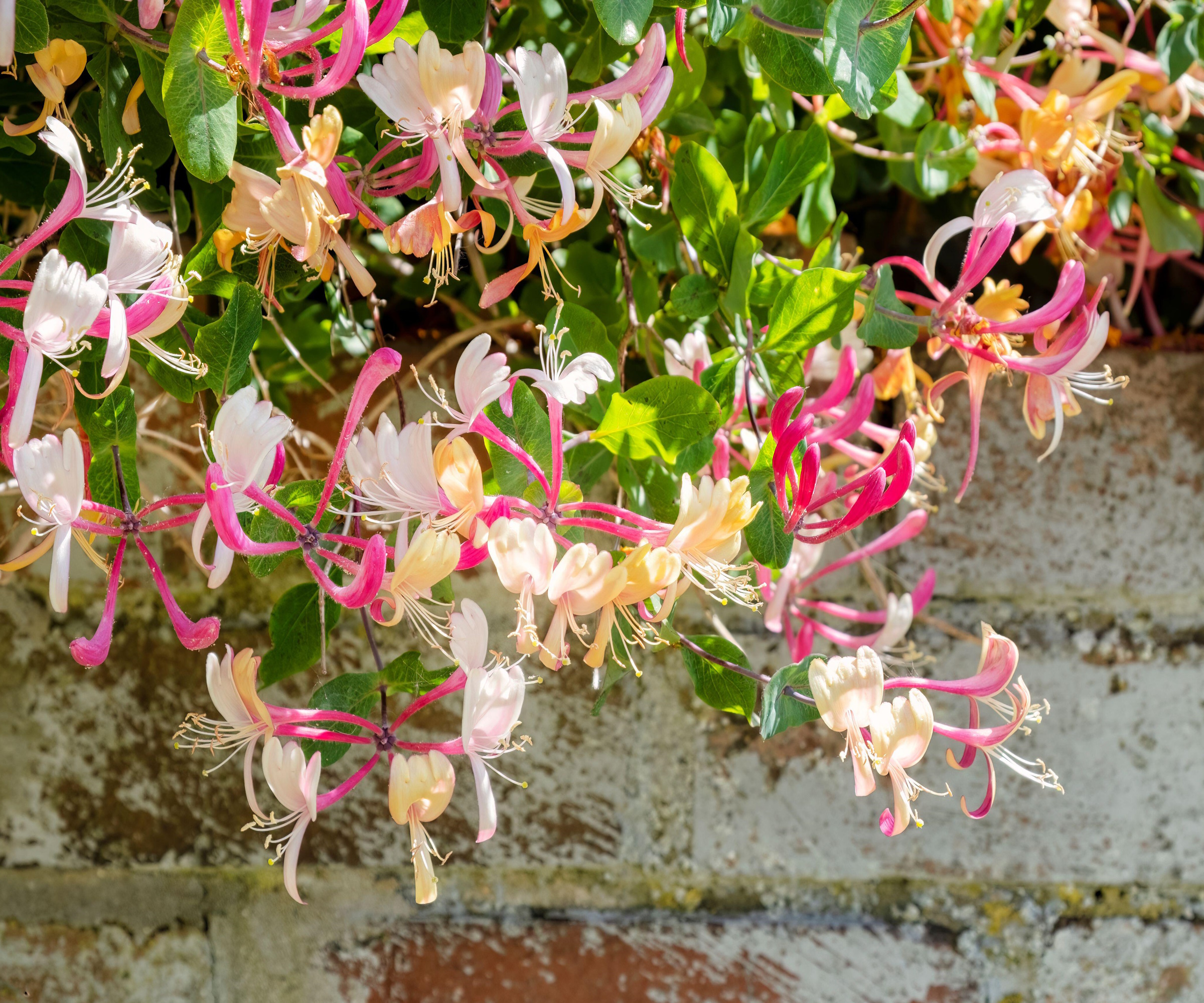
If you are seeking a good looking climbing plant, that also scores highly for its wildlife friendly credentials then try this cottage garden favorite.
‘Honeysuckle is loved for its fragrant, tubular flowers that attract pollinators, known in particular as a favorite for hummingbirds,’ says master gardener, Tabar Giffford, ‘The profuse tubular blooms are irresistible to hummingbirds providing them with natural nectar all season long. There are many varieties which are well behaved and some that are native, such as the Major Wheeler available at American Meadows and also High Country Gardens.'
There's more on offer than just creamy-yellow blooms too, as Tabar continues, 'Honeysuckle offers a range of colors, from white and yellow to red and pink, and can add a delightful scent and vibrant color to your home's exterior.’

As the Customer Experience and Partnership Cultivator at American Meadows, Tabar Gifford, a Master Gardener, and dedicated “plant geek,” passionately fosters connections. With a lifelong love for gardening and nature, and a background in environmental studies and sustainable community development, she combines horticultural expertise with a commitment to education.
9. Star jasmine
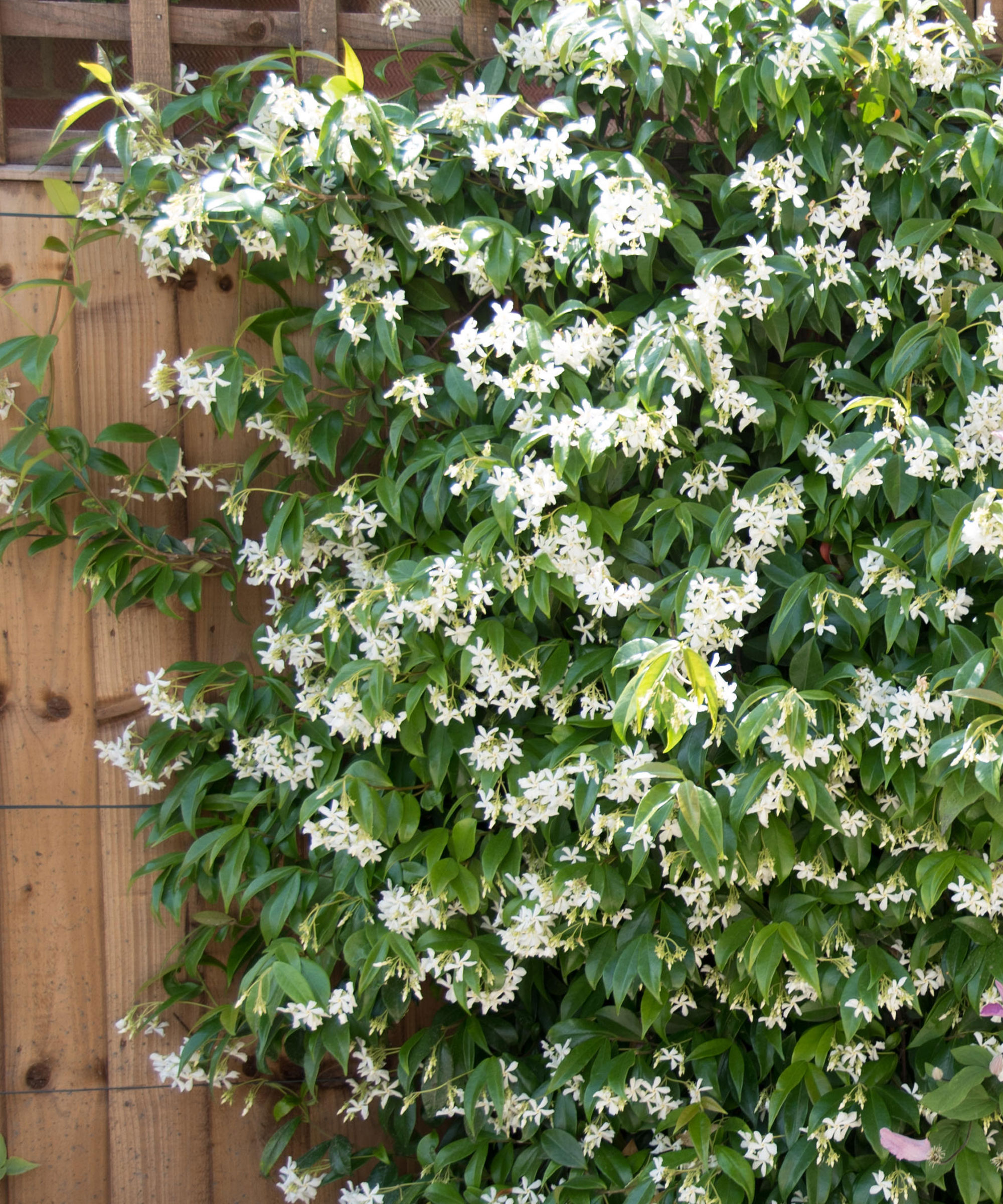
Knowing how to grow star jasmine can transform your yard and your home’s exterior into a dreamy mass of white fragrant blooms. Known for attracting invaluable pollinators, the tiny star-like flowers appear on the twining stems during summer and release a potent, sweet perfume that permeates the air. The long, deep-green leaves also put on a stunning show. Glossy and evergreen they often turn a bronze-red in fall.
Happy in part shade, and able to thrive in darker areas too, these plants are unfussy about their soil conditions. Native to Asia, they love humidity and warm temperatures, and are hardy in USDA zones 7-10.
Although the stems are twining, Trachelospermum jasminoides does need trellis or a wire support to scale up walls. It will also appreciate a sheltered spot that’s not north-facing.
Transforming the outside of your home with climbers is a great opportunity to increase the biodiversity of your yard and personalise its kerb appeal too. For more ideas be sure to check out our selection of the best fast growing climbers.

Journalist Jill Morgan has spent over 20 years writing and editing gardening, interior and property features. Titles she has worked on include The English Home, House Beautiful, Ideal Home, Houzz and Modern Gardens and she writes regularly for H&G as a Contributing Editor. Whilst she is a dab hand at renovation projects and DIY, she is happiest when out digging in the garden or planning a new border.
- Thomas RutterContent Editor